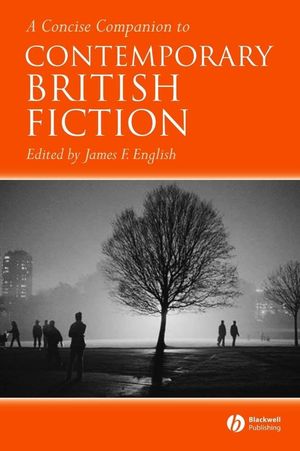A Concise Companion to Contemporary British FictionISBN: 978-1-4051-2000-5
Hardcover
296 pages
December 2005, Wiley-Blackwell
 This is a Print-on-Demand title. It will be printed specifically to fill your order. Please allow an additional 10-15 days delivery time. The book is not returnable.
Other Available Formats: Paperback
|
||||||
Notes on Contributors ix
Introduction: British Fiction in a Global Frame 1
James F. English
The increasing importance since the 1970s of transnational markets and circuits of exchange, and the consequent repositioning of British fiction in “world literary space.”
Part I Institutions of Commerce
1 Literary Fiction and the Book Trade 19
Richard Todd
The triangulated relation between (i) authors and agents, (ii) publishers, and (iii) retail booksellers, and
the rise of the retailers to a position of dominance.
2 Literary Authorship and Celebrity Culture 39
James F. English and John Frow
The phenomenon of literary celebrity and its new articulation of the authorial signature with the brand
name. Authors considered include Martin Amis, J. K. Rowling, Salman Rushdie, Zadie Smith, and Fay Weldon.
3 Fiction and the Film Industry 58
Andrew Higson
The interaction of contemporary British literature and the cinema, considered as both businesses and
cultures. Discusses the full range of novels adapted for the screen, with an extended case study of the
adaptation of A. S. Byatt’s Possession.
Part II Elaborations of Empire
4 Tropicalizing London: British Fiction and the Discipline of Postcolonialism Nico Israel 83
The emergence of postcolonial theory and, subsequently, of a canon of postcolonial novels. Discusses such theorists as Homi Bhabha, Stuart Hall, and Paul Gilroy, and the novelists Anita Desai, Hari Kunzru, Hanif Kureishi, V. S. Naipaul, Ben Okri, and Salman Rushdie.
5 New Ethnicities, the Novel, and the Burdens of Representation 101
James Procter
The shifting relationship between race, writing, and representation from the late 1970s to the present, with particular reference to the work of Monica Ali, Farrukh Dhondy, Hanif Kureishi, Salman Rushdie, and Zadie Smith.
6 Devolving the Scottish Novel 121
Cairns Craig
Contemporary Scottish fiction in the context of Scottish nationalism and the politics of devolution, with reference to the work of Janice Galloway, Alasdair Gray, James Kelman, A. L. Kennedy, and Alan Warner.
7 Northern Irish Fiction: Provisionals and Pataphysicians 141
John Brannigan
How fiction in Northern Ireland has responded to the politics of the interregnum since 1993, with particular attention to the work of Seamus Deane, Glenn Patterson, Deirdre Madden, Robert McLiam Wilson, and Ciaran Carson.
Part III Mutations of Form
8 The Historical Turn in British Fiction 167
Suzanne Keen
The rising status of historical fiction in contemporary Britain as more self-consciously “literary” forms of the genre have emerged alongside traditional verisimilar historical novels and women’s historical romances. Among the many authors discussed are A. S. Byatt, Bernadine Evaristo, Hilary Mantel, Craig Raine, Salman Rushdie, and Edmund White.
9 The Woman Writer and the Continuities of Feminism 188
Patricia Waugh
The persistent concerns and contradictions in women’s fiction since the 1960s, with reference to Angela Carter, Margaret Drabble, Helen Fielding, Doris Lessing, Iris Murdoch, and Fay Weldon.
10 Queer Fiction: The Ambiguous Emergence of a Genre 209
Robert L. Caserio
The consolidation of queer fiction as a recognized and important literary category in Britain, and the ongoing tension between this body of literature and the politics of gay rights and gay identity. Writers considered include Pat Barker, Neil Bartlett, Alan Hollinghurst, Jackie Kay, Adam Mars-Jones, Colm Toibin, and Jeanette Winterson.
11 The Demise of Class Fiction 229
Dominic Head
The waning of class consciousness in British fiction as the traditional, adversarial model of class has given way to new understandings both of social inequity and of collective empowerment. With reference to a range of writers, including Nell Dunn, Livi Michael, Alan Sillitoe, and Raymond Williams.
12 What the Porter Saw: On the Academic Novel 248
Bruce Robbins
The academic novel considered as a disguised version of the upward mobility story, with the university serving as a figure for the welfare state, the frame in which the ambiguities of upward mobility are played out. Focuses on the novels of Kingsley Amis, Malcolm Bradbury, A. S. Byatt, Amit Chaudhuri, and David Lodge.
Index 267



